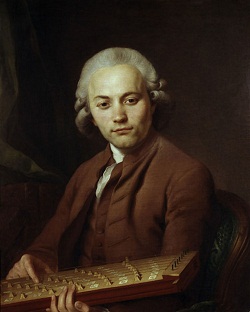How are you?
This week's lecture is “Carl
Maria von Weber”, the 9th topic of “Classical
Music”, which is a summary of the contents of “94. Classical Music: 9. Carl Maria von Weber” introduced on July 1st, 2017.
Carl Maria von Weber
was a German composer, conductor, virtuoso pianist, guitarist and critic, born
on November 18 (or 19), 1786, and died on June 5, 1826. He was one of the first
significant composers of the Romantic era. Weber, best known for his operas,
played a major role in the development of German Romantische Oper (German
Romantic opera).
 |
| Carl Maria von Weber, Ferdinand Schimon (1825) |
Weber was born in
Eutin, Germany, as the eldest of three children of Franz Anton von Weber and
his second wife and singer Genovefa Weber. He was baptized Catholic on November
20, 1786. Originally came from the far south of Germany, his parents were
Catholic, and the "von" in his name was a sort of affectation of his
father, who was not an aristocrat.
 |
| Franz Anton von Weber |
 |
| Genovefa Weber |
Throughout his youth, Weber moved with his father and family to many locations including Hamburg, Salzburg, Freiberg, Augsburg and Vienna. Accordingly, he studied music with many teachers such as his father, Johann Peter Heuschkel, Michael Haydn, Giovanni Valesi, Johann Nepomuk Kalcher and Georg Joseph Vogler.
 |
| Georg Joseph Vogler |
He composed
non-operatic music, including two symphonies, a bassoon concerto, piano pieces
such as “Konzertstück in F minor” and “Invitation to the Dance”, and many
pieces featuring clarinet, mainly written for the virtuoso clarinetist Heinrich
Baermann.
 |
| Heinrich Baermann |
He died during the
night on 5 June 1826 while sleeping at the home of his friend Sir George Thomas
Smart and was buried in London.
 |
| Sir George Thomas Smart, William Bradley |
Eighteen years later,
in December 1844, his remains were transferred to the family burial place in
the Old Catholic Cemetery (Alter Katholischer Friedhof) in Dresden, where his
youngest son Alexander, who at the age of 19 had died of measles seven weeks before,
was buried. The eulogy at the reburial was delivered by Wagner.
 |
| Weber's grave, Old Catholic Cemetery, Dresden |
Weber's unfinished
opera "Die drei Pintos" was originally commissioned to Giacomo
Meyerbeer by his widow, but was eventually completed by Gustav Mahler, who
conducted the first performance in Leipzig on January 20, 1888.
 |
| Giacomo Meyerbeer |
 |
| Gustav Mahler |
His operas
"Silvana", "Abu Hassan", "Der Freischütz",
"Die drei Pintos", "Euryanthe" and "Oberon" had a
great influence on subsequent German composers including Heinrich Marschner,
Giacomo Meyerbeer and Richard Wagner, and his compositions for piano influenced
those of Chopin and Liszt. His most famous work, "Der Freischütz"
remains among the most significant German operas.
 |
| Statue of Carl Maria von Weber at Theaterplatz, Dresden, Ernst Rietschel (1855-1860) |
Thank you.





No comments:
Post a Comment